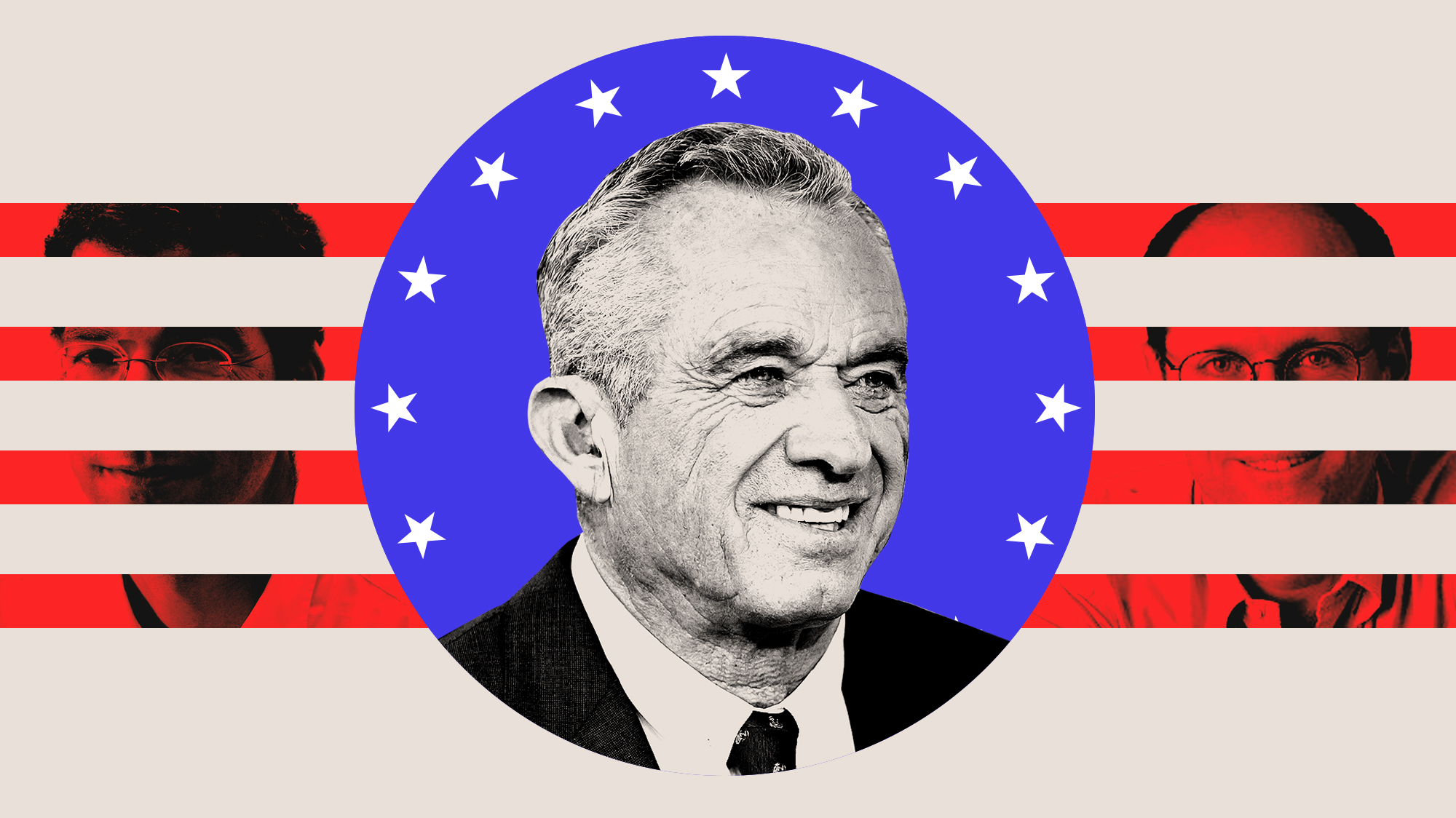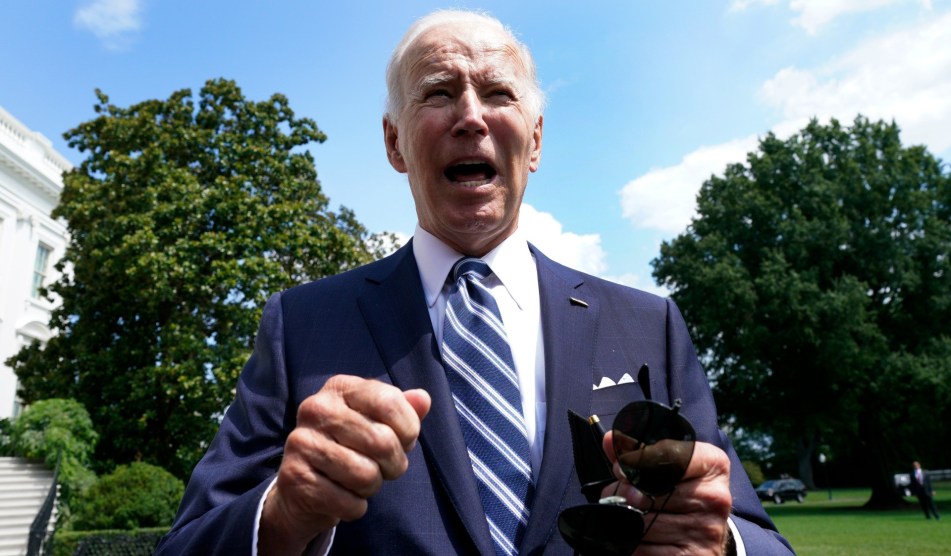When Robert F. Kennedy Jr. announced his bid for the presidency at the Boston Park Plaza Hotel on April 19, 2023, he pledged to a cheering crowd to “end the corrupt merger of state and corporate power that is threatening now to impose a new kind of corporate feudalism in our country; to commoditize our children, our purple mountain’s majesty; to poison our children and our people with chemicals and pharmaceutical drugs; to strip-mine our assets; to hollow out the middle class and keep us in a constant state of war.” Put simply, not very many people expected that the Kennedy campaign would garner sufficient support to further explain those lofty goals, much less accomplish them. The New York Times pronounced him “unlikely to pose a serious threat to Mr. Biden.”
But now, two months later, the anti-vaccine activist turned presidential hopeful is doing a lot better in his bid for the Democratic nomination than anyone had expected. It’s early days, of course, but a May CNN poll suggested that he should not be consigned to being a mere curiosity, or a fringe candidate: A fifth of Democratic and Democratic-leaning Independent voters said they favored him over President Biden. As for his financial support, his campaign disclosures will not be released until mid-July.
Over the last month, the percentages have dwindled to between 8 and 15, but for any challenger to a sitting president from the same party, these numbers are pretty high. By comparison, as of last week, among Republicans, Florida Gov. Ron DeSantis was polling at 21 percent, to Donald Trump’s 59 percent. The support Kennedy commands is even more notable considering that Kennedy’s platform is, to put it mildly, eccentric. The founder of the anti-vaccine advocacy group Children’s Health Defense, he recently remarked to podcast host Joe Rogan, “Wi-Fi radiation opens up your blood-brain barrier, and so all these toxins that are in your body can now go into your brain.” In a conversation earlier this month with Twitter executive chairman Elon Musk, Kennedy raved about how Covid was a bioweapon and suggested that secret labs the world over are designing special weapons designed to kill only people of certain races. Last week, in a SiriusXM interview, he said that he believed that Russia was “acting in good faith” in its invasion of Ukraine. Despite his storied last name and the fact that he is running as a Democrat, over the last two years, Kennedy has allied himself with prominent right-wing activists. In 2021, he spoke at the ReAwaken America tour organized by former national security adviser to former President Donald Trump and conspiracy theorist Mike Flynn.
Given this unusual collection of beliefs, it is not surprising that the CNN poll found that Kennedy’s greatest strength among voters so far is his family name. He is the third of Robert F. Kennedy’s 11 children and the nephew of President John F. Kennedy, though his relatives have made it clear that they don’t endorse his political views. As his sister, Kerry Kennedy, told Insider, “I love my brother Bobby, but I do not share or endorse his opinions on many issues, including the Covid pandemic, vaccinations, and the role of social media platforms in policing false information.”
Luckily for Kennedy, other people do—and some of them are looking to bankroll his campaign. “Right now, you have a candidacy pretty much based on name recognition,” says Brendan Glavin, a senior data analyst with the money-in-politics research organization OpenSecrets. But “if he can use unlimited super PAC money to push the candidacy forward,” he says, “then you start to reach a point where the Biden team is going to have to make decisions on how they want to handle that.”
One of Kennedy’s biggest—and richest—fans is the entrepreneur Steve Kirsch, who made an early Silicon Valley fortune as a pioneer of the optical computer mouse in 1980. Kirsch has been a longtime donor to progressive candidates and causes; in the early aughts, through his foundation, he supported many liberal groups, including the League of Women Voters, the liberal watchdog group People for The American Way, and the disinformation monitoring outlet Media Matters for America. The foundation is no longer active, but records show tens of thousands of dollars in donations from Kirsch himself to the Democratic party over the last decade—to Barack Obama, Hillary Clinton, and Nancy Pelosi, among many other candidates for various offices.
Afflicted with a rare form of blood cancer, Kirsch has also donated extensively to health-related charities. Early in the pandemic, he pumped millions of dollars of his own money into research for potential Covid treatments, including ivermectin. His efforts were at first lauded by serious researchers—but many of those alliances eroded after Kirsch continued to insist that the drugs worked, even after the clinical trials did not pan out. That break with the scientific community led him to contrarian corners of the medical internet, where anti-vaccine activists like Kennedy are folk heroes.
Now, with the same energy that he once devoted to progressive causes, Kirsch rails against most vaccines—not just the ones for Covid—and other public health measures. In his description of his Substack, which has more than 225,000 subscribers, he says, “The data shows that vaccines are ruining the health of Americans and driving the epidemic in neurological conditions.” Lately, his anti-vaccine advocacy has included promises of cash prizes: In March, he boarded a flight and offered his seatmate $100,000 to remove her mask for the entire flight. (She declined.) In June, he challenged Baylor College of Medicine vaccinologist Peter Hotez to debate Kennedy on the safety of vaccines, offering to donate $100,000 to the charity of Hotez’s choice if he prevailed. (Hotez, too, declined—and has been the target of a harassment campaign.)
Kirsch’s entrance into the world of anti-vaccine activism appears to have changed his political sensibilities, too. As physician and disinformation researcher Allison Neitzel recently reported, Kirsch appeared last fall on the live stream show of far-right former Trump adviser Steve Bannon. Recent records of Kirsch’s political giving show that he supported the campaign of Sen. Ron Johnson (R-Wisc.). Kirsch’s opinion of some of the former groups that he supported seems to have soured, too; for example, last year Kirsch threatened to sue Media Matters over its coverage of claims he made about vaccines on Fox News.
In March, before Kennedy announced his bid for president, I attended a conference that Kirsch had helped put together where mostly right-wing lawyers discussed strategies for suing people over pandemic protection measures like vaccine mandates and hospital treatment protocols. When I interviewed Kirsch, he was eager to share the public health insights he had learned from Kennedy. For example, Kirsch recounted how Kennedy noted that the current overload of childhood vaccines has caused an uptick in autism (a theory that persists despite an absolute torrent of evidence to the contrary). “Bobby Kennedy says that he never runs into any autistic person his age,” he said. “And the reason is not because they died. It’s because there wasn’t any autism at that time [when older people received fewer childhood vaccines].” There already had been murmurings of Kennedy’s potential presidential run, and I wondered whether Kirsch planned to support him. “I want to know how much money you would give Kennedy if he if he were to run,” I asked. “I don’t know the answer to that,” Kirsch replied, “but I’ve started the super PAC for him.” He wrote about these plans on his Substack. “The federal agencies are so brain damaged it will take major surgery to fix them,” he wrote. “I can’t think of anyone more qualified to clean up the mess and unite the country than RFK Jr.”
Kirsch, who didn’t respond to my requests for comment for this article, does not yet appear to have donated to Kennedy’s super PAC, American Values 2024. But some other rich guys did. Before it was called American Values 2024, Kennedy’s super PAC was called People’s Pharma Movement; its goal, according to its website, was to fight “the corruption and voracious control of the drug industry,” though much of its advocacy seems to have been around opposing vaccines. Last year, its largest donation—$500,000—was from another tech entrepreneur named Mark Gorton, who created the early peer-to-peer file-sharing service LimeWire and now runs a hedge fund. Like Kirsch, Gorton appears to have historically supported progressive causes, with special attention, until quite recently, to the creation of bike lanes. He has supported a long list of Democratic candidates, as well—mostly in down-ballot races in New York.
But since the pandemic, he’s begun giving money to prominent Republicans, including $2,000 each last year to Ron DeSantis and Sen. Ron Johnson (R-Wisc.). And, of course, the half million dollars to People’s Pharma Movement. When I reached out to Gorton to discuss his philanthropy, he explained that in the last few years, he has become interested in the outsize political influence of the pharmaceutical industry on politicians. “As I learned more and more about it, the more I realized just what a corrupt industry it was,” he said. That was what led him to fund the People’s Pharma Movement.
When I asked Gorton what he thought about the People’s Pharma Movement’s stance on vaccines, he bristled. He told me that he had googled me and that I appeared to be a “shill for big pharma” who wrote articles “encouraging people to do things that hurt themselves.” I was stunned by how quickly our conversation had turned. “How did the Democratic Party and the left become a party of mercury poisoning?” he demanded. “Why are you advocating mercury poisoning?” I assured him that I was not, in fact, a fan of mercury poisoning, nor was my salary paid for by the pharmaceutical industry, but apparently, he was only getting started. “You constantly write hit pieces about people who were pointing out that children’s vaccines have been and are filled with mercury and aluminum,” he said, his voice rising, “and that we are systematically exposing incredibly small babies to very high doses of toxic metal.”
For the next 20 minutes, the conversation continued in this tense way. I asked Gorton why he gave the $2,000 to DeSantis, an amount he characterized as “a little bit.” He said that he appreciated DeSantis’ standing up to the pharmaceutical industry on the issue of Covid vaccines. I asked if that was more important to him than the Florida governor’s efforts to curtail the rights of LGBTQ people, and he accused me of implying “that there is some sort of implicit trade-off.” He fumed, “It’s like a really hateful way to approach the world.” I listened to him for a little longer, thanked him, and excused myself.
Another notable contribution to People’s Pharma Movement was $50,000 from Skyhorse Publishing, Inc., whose authors include Kennedy—most recently his 2022 work, The Real Anthony Fauci, a rambling excoriation of the now-retired public health leader’s handling of the pandemic. The CEO of Skyhorse Publishing is Tony Lyons, who is also listed as a team member on the website of Kennedy’s American Values 2024 super PAC. In addition to Kennedy’s books, Skyhorse has published a number of titles criticizing immunizations, including The War on Ivermectin by anti-vaccine activist Pierre Kory, Plague of Corruption by Plandemic viral video star Judy Mikovits, and a children’s book called I’m Unvaccinated and That’s OK! In 2014, Skyhorse published a conspiratorial book by Republican political operative Roger Stone called The Man Who Killed Kennedy: The Case Against LBJ. In his recent interview with Joe Rogan, Kennedy said he was “aware” of the possibility that the CIA could assassinate him.
Skyhorse doesn’t exclusively publish these kinds of books. In 2015, it garnered attention for its investigative imprint, especially for a book on police brutality against Black men in Baltimore, The Beastside: Living (and Dying) While Black in America by D. Watkins. Lyons has defended his publishing decisions, emphasizing that he is not one to be swayed by the changing winds of public sentiment. “I don’t begrudge people for anything they believe,” he told the Guardian last year. “But at the same time, I’m not willing to make my decisions on what to publish based on what other people would like me to publish, whoever they are.”
This cast of left-meets-right Kennedy superfans clearly wants to help propel Kennedy out of the fringe and into the spotlight—but whether they’ll be able to do it, says Open Secrets’ Glavin, remains to be seen. Usually, he notes, large donations on their own are not enough to move a nascent campaign into a competitive position; they also need lower-dollar contributions from many supporters. But that’s the catch: Candidates can’t get that broader support without flashy ads, which, of course, is where the rich guys come in. If Kennedy gets “one of these contrarian, wealthy supporters to put a lot of money into the super PAC,” says Glavin, “he’s going to be able to get out there and really make his presence felt.”
















